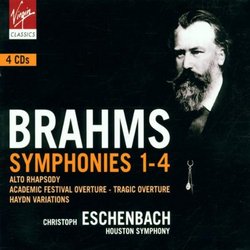| All Artists: Johannes Brahms, Christoph Eschenbach, Houston Symphony Orchestra Title: Brahms: Symphonies Nos. 1-4 Members Wishing: 0 Total Copies: 0 Label: EMI Classics Release Date: 5/7/2002 Genre: Classical Styles: Opera & Classical Vocal, Symphonies Number of Discs: 4 SwapaCD Credits: 4 UPCs: 724356208124, 724356208155 |
Search - Johannes Brahms, Christoph Eschenbach, Houston Symphony Orchestra :: Brahms: Symphonies Nos. 1-4
 | Johannes Brahms, Christoph Eschenbach, Houston Symphony Orchestra Brahms: Symphonies Nos. 1-4 Genre: Classical
|
Larger Image |
CD Details |
CD ReviewsGreat Brahms Cycle From An Unexpected Place Erik North | San Gabriel, CA USA | 08/29/2003 (5 out of 5 stars) "It's not all the time that it happens, but every once in a while, a symphonic cycle box set made by an orchestra that is not universally seen as a world-class outfit makes an impact. Such is the case here with this cycle of Brahms' four symphonies and various other works performed here by the Houston Symphony Orchestra under the leadership of Christoph Eschenbach, who served as Music Director from 1989 to 2001.This Brahms cycle was made during the early 90s, and shows both Eschenbach and the Houston Symphony in top form. Eschenbach observes the first-movement exposition repeats of the first three symphonies, thus making their running times longer (the opening of No. 1 is almost nineteen minutes; that of No. 2 nearly twenty-two; and that of No. 3 over thirteen and a half), but the quality is never sacrificed. Dunja Vejzovic and the male voices of the Houston Symphony Chorus are excellent on the recording of Brahms' early choral work Alto Rhapsody; and the orchestra does good work on the Haydn Variations, the Academic Festival Overture, and the highly charged Tragic Overture.Given all of this, it is bewildering that it has only been in recent times that the Houston Symphony has achieved the respect it has long deserved. After all, many big names had stood on the podium before Eschenbach: Beecham, Stokowski, Barbirolli, and Previn. But Eschenbach seemed to break through the orchestra board's long-time ultra-conservative musical mentality, and thus he elevated the Houston Symphony to world-class status. The proof can be found in this superbly recorded and superbly priced Brahms set, which is well worth seeking out." The best Brahms for the best price! Theron N. Kagnoff | Puerto Vallarta, Mexico | 09/23/2002 (5 out of 5 stars) "When I saw this inexpensive 4cd box set, I knew that I had to get it, especially after hearing Eschenbach's recording of Bruckner's 6th w/Houston SO (the best ever btw). Some conductors (eg. Karajan) try to take you into different worlds in the different symphonies. However Eschenbach takes you to different places withnin the same world, giving the listener a more organic-whole musical listening experience. The rhythms are sharp, the readings are dark (Brahms was a hard-core loner) and intense. The opening of the first sym. reminds me of Klemperer, so deep and powerful. The stings are flawless and full of support. When one looks at set prices like Abbado's...the eschenbach set is one of the best Brahms bargain sets of all time. The filler pieces are equally strong, as are the singers in the alto rhap. A must have for all Brahmsians!!" A jewel in my collection V. W. Leung | Houston, TX | 11/14/2005 (5 out of 5 stars) "Brahms was the torchbearer of the First Viennese School, holding down tradition's fort in the face of the Liszt/Wagner music of the future. Despite his preference for Classical forms and structure, his temperament was unquestionably Romantic. Brahms resolved these seemingly opposite forces in his music, but realizing Brahms' vision in performance can be elusive. Among the symphony cycles, rarely has Brahms sounded so fully Classical and fully Romantic simultaneously than in this set.
The critical element in Eschenbach's readings is that they are somewhat slower than most, with tempi similar to those of Furtwangler's. This approach allows the thick orchestration to breathe, making it easier to appreciate Brahms' unrivaled mastery of musical architecture. Furthermore, it highlights his imagination while remaining within the confines of the traditional symphonic forms. For the slow movements, it fully showcases Brahms' lyricism that a faster tempo would have glossed over. I did find the first movement of the Fourth to be a little slow, but it was still within the realm of reasonable interpretation. I'm sure it will grow on me as I listen more. The inclusion of four add-ons is a nice bonus--most Brahms sets include only the Academic Festival and Tragic Overtures. No revelations here, but they are well performed. Overall, an unbeatable value." |

 Track Listings (5) - Disc #1
Track Listings (5) - Disc #1